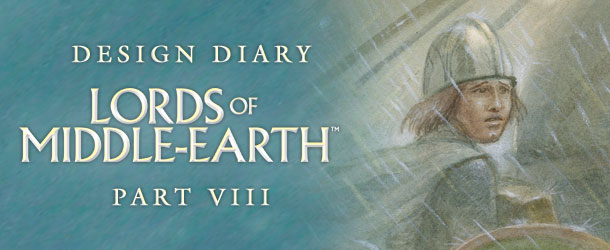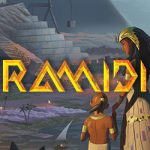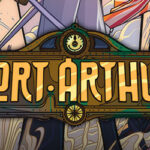Since the very first draft of what was to become Lords of Middle-earth, we started to work around the idea of including alternate versions of the Companions. The idea of alternate versions of existing characters was already featured in Battles of the Third Age and we had already decided to revisit it in Lords - it is a good way to include personalities which are new from the point of view of game play, without straying too far away from the literary canon that is the foundation of the game.
In Lords of Middle-earth, as a logical extension of the inclusion of Elrond and Galadriel as Keepers of the Elven Rings of Power, we wanted to include an alternate version of Gandalf the Grey. Why not do the same for the other characters in the Fellowship?
In the beginning, we considered to include companions different from those appearing in the book – people like Glorfindel or Faramir. But “what-ifs” are a slippery ground, and the border between “interesting” and “unbelievable” is sometimes very thin. We decided that this was really too much of a departure from the books, and started to consider a different approach to this design challenge.
First of all – did the game really need alternate Companions? Or at least, could it have an improvement from such an addition?
Companions in War of the Ring work in a very linear fashion, to avoid cluttering an already complex game with individual rules exception, which only come in the game once in a while. Except Strider and Gandalf on one end, and the Hobbits on the other, the companions are all similar: Gimli, Legolas, Boromir all share the same Leadership, Level, and abilities, and are only made different by Nationality and by the Event cards linked to them.
They were originally designed around the concept that, at every step of the quest of the Fellowship, the Free People player should be faced with the choice of keeping them to shield Frodo from harm, or send them out to help the fight of the Free People. However, in actual game play (especially when the game is played in a competitive, rather than narrative, way), this trade off is not as well balanced as we wanted it to be. Separating them from the Fellowship costs a Character action, and moving them around costs additional actions- actions that, most of the time, the Free People player prefers to spend to advance the Fellowship toward Mordor. Most of the time, Companions are separated only when certain Event cards that provide a “boost” to separation are used (for example, “There and Back Again”), or if he's forced to by “The Breaking of the Fellowship” Shadow Event. Too often, they just end up as “monster fodder” to save the Ringbearer from taking on more Corruption.
We considered that this was a loss in terms of the variety of strategies available to the Free People player, and also not “right” in the light of what Tolkien tells us about these characters.
“They are willing to go at least to the passes of the Mountains, and maybe beyond,” Elrond says of Legolas and Gimli.
And Aragorn says about himself and Boromir: “I am [going to Minas Tirith with Boromir]". “And the Sword-that-was-Broken shall be re-forged ere I set out to war. But your road and our road lie together for many hundreds of miles. Therefore Boromir will also be in the Company. He is a valiant man.”
And again Elrond, talking of Merry and Pippin, says: “The Shire, I forebode, is not free now from peril; and these two I had thought to send back there as messengers, to do what they could, according to the fashion of their country, to warn the people of their danger.”
The meaning is very clear: the Companions of the Ring are not meant necessarily to die bravely to defend Frodo, as the Council is convinced that a Hobbit that walks alone, or almost alone, straight into the maws of Mordor has more chances to succeed as a full host (strange but, in retrospect, true!). Granted that it’s useful that they travel with Frodo for a while, they have their own agendas (or possible alternative agendas, as Elrond says of Merry and Pippin). The only characters who clearly do not have a choice are Frodo and Sam, with their destiny to be the Ring-bearers.
So, it is definitely possible, within the boundaries set by the narrative, that some of the Companions could have departed Rivendell to get to their homelands – and considered that between the Council of Elrond and the day the “Ring goes south” there’s a wait lasting weeks and months, it is not impossible to think that they could have decided to depart sooner than the Ring did.
So, the solution we devised was to create what we consider an acceptable “what-if” about the role of each Companion in the story. The way Companions are described in War of the Ring becomes only one of the possible paths in the story – the possibility that they wish to remain with Frodo until the very end, or at least as long as possible. To reflect the other possibilities hinted at by the story, we decided to provide alternate designs to choose from.
First of all, the Companions were to be redesigned in a way that made them less powerful in some instances, but easier to separate – they would be less effective as “Corruption shields”, and less powerful as military Leaders, but as stalwart as before as defenders of their homeland. A new Guide ability was designed for Boromir, Legolas and Gimli, allowing them to separate from the Fellowship as an effect of the Hunt, rather than spending an Action die.
At the same time, we also considered that, in the long wait between the Council and the decision to send the Ring south, these characters could decide that their sword, bow and axe was needed elsewhere rather than in Rivendell, and that they would depart – reaching their homeland before the Fellowship leaves for the quest to Mount Doom. So, the Free People player may decide that they start play in their respective home region.
Similarly, we considered the possibility - clearly stated by Elrond - that Merry and Pippin could be sent to the Shire, to help defending their people. This version of the two Hobbit friends make them better than before to be involved in the military action – they have now the “Champion of the Shire” ability, similar to “Captain of the West” but only usable for battles in the North; and if eliminated in battle, they just vanish and reappear again in a neighboring region. They may start the game in The Shire, too. However, if used together, they are possibly even better than before inside the Fellowship - as their new Guide ability gives the possibility of canceling a Hunt tile by eliminating both of them. This gives to the Free People player an interesting choice about how to use them, and whether to prefer them, or not, to their previous version.
The presence of new abilities, and the choice to start with Companions set up in their home region, creates a lot of different options in an area of the game - the initial setup and the composition of the Fellowship - that until now did not offer any choice. Now, the Free People player must take some decisions before the game starts. Does he want to focus on the military defense of one or more Nations since the beginning? Does he want to use the "old" or "new" version of each character? If the new characters are used, should he place them in or out of the Fellowship?
Our main concern during the design of these characters, and their testing, was that they should be neither stronger nor weaker than their previous versions (else, we would only create the appearance of choice!). We also wanted be sure that the new versions could not contribute too much towards a Free People Military Victory, a strategy that we don’t want to see as dominant in the game, to avoid going too far from the original narrative.
With our goals clearly set, the redesign of all these characters proved to be quite straightforward, and we almost immediately settled on a version which was to be the one used in the published game. The two which proved to be the most difficult to redefine were Gandalf and Strider. We already discussed Gandalf in Part 3 and Part 5 of this series of articles, but what about Strider? More about him in the next article… The end is near!














Follow Us on